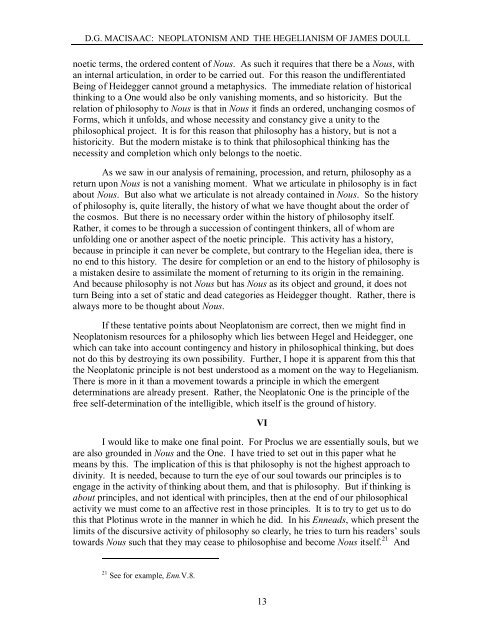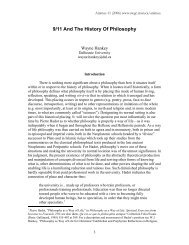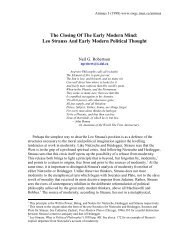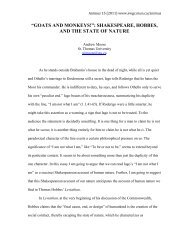Neoplatonism And The Hegelianism Of James Doull1
Neoplatonism And The Hegelianism Of James Doull1
Neoplatonism And The Hegelianism Of James Doull1
Create successful ePaper yourself
Turn your PDF publications into a flip-book with our unique Google optimized e-Paper software.
D.G. MACISAAC: NEOPLATONISM AND THE HEGELIANISM OF JAMES DOULLnoetic terms, the ordered content of Nous. As such it requires that there be a Nous, withan internal articulation, in order to be carried out. For this reason the undifferentiatedBeing of Heidegger cannot ground a metaphysics. <strong>The</strong> immediate relation of historicalthinking to a One would also be only vanishing moments, and so historicity. But therelation of philosophy to Nous is that in Nous it finds an ordered, unchanging cosmos ofForms, which it unfolds, and whose necessity and constancy give a unity to thephilosophical project. It is for this reason that philosophy has a history, but is not ahistoricity. But the modern mistake is to think that philosophical thinking has thenecessity and completion which only belongs to the noetic.As we saw in our analysis of remaining, procession, and return, philosophy as areturn upon Nous is not a vanishing moment. What we articulate in philosophy is in factabout Nous. But also what we articulate is not already contained in Nous. So the historyof philosophy is, quite literally, the history of what we have thought about the order ofthe cosmos. But there is no necessary order within the history of philosophy itself.Rather, it comes to be through a succession of contingent thinkers, all of whom areunfolding one or another aspect of the noetic principle. This activity has a history,because in principle it can never be complete, but contrary to the Hegelian idea, there isno end to this history. <strong>The</strong> desire for completion or an end to the history of philosophy isa mistaken desire to assimilate the moment of returning to its origin in the remaining.<strong>And</strong> because philosophy is not Nous but has Nous as its object and ground, it does notturn Being into a set of static and dead categories as Heidegger thought. Rather, there isalways more to be thought about Nous.If these tentative points about <strong>Neoplatonism</strong> are correct, then we might find in<strong>Neoplatonism</strong> resources for a philosophy which lies between Hegel and Heidegger, onewhich can take into account contingency and history in philosophical thinking, but doesnot do this by destroying its own possibility. Further, I hope it is apparent from this thatthe Neoplatonic principle is not best understood as a moment on the way to <strong>Hegelianism</strong>.<strong>The</strong>re is more in it than a movement towards a principle in which the emergentdeterminations are already present. Rather, the Neoplatonic One is the principle of thefree self-determination of the intelligible, which itself is the ground of history.I would like to make one final point. For Proclus we are essentially souls, but weare also grounded in Nous and the One. I have tried to set out in this paper what hemeans by this. <strong>The</strong> implication of this is that philosophy is not the highest approach todivinity. It is needed, because to turn the eye of our soul towards our principles is toengage in the activity of thinking about them, and that is philosophy. But if thinking isabout principles, and not identical with principles, then at the end of our philosophicalactivity we must come to an affective rest in those principles. It is to try to get us to dothis that Plotinus wrote in the manner in which he did. In his Enneads, which present thelimits of the discursive activity of philosophy so clearly, he tries to turn his readers’ soulstowards Nous such that they may cease to philosophise and become Nous itself. 21 <strong>And</strong>VI21 See for example, Enn.V.8.13
















